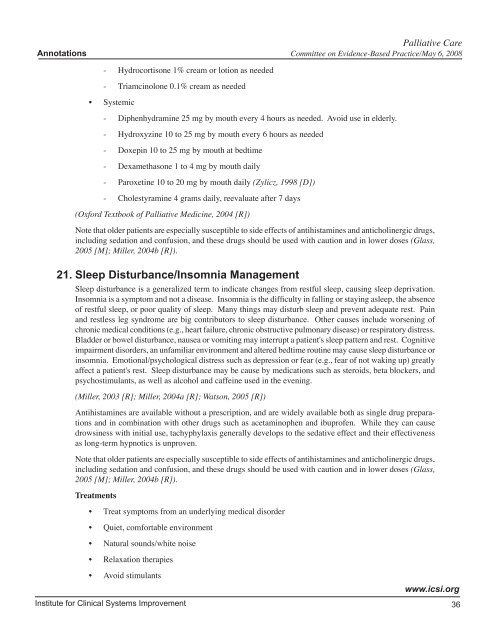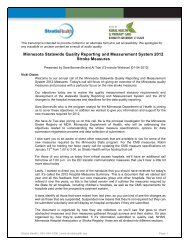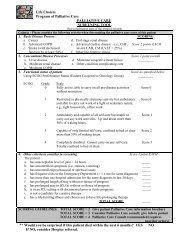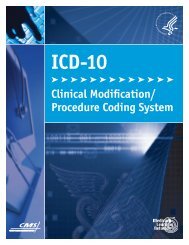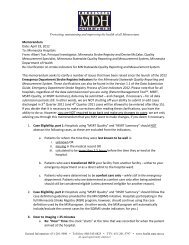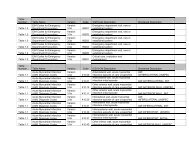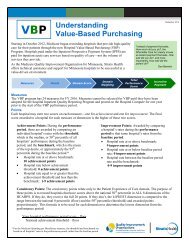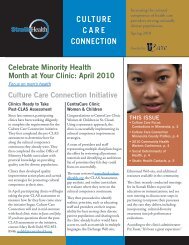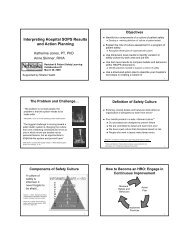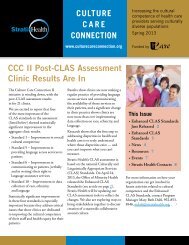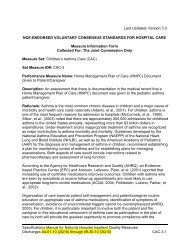Palliative Care Order Set - Stratis Health
Palliative Care Order Set - Stratis Health
Palliative Care Order Set - Stratis Health
You also want an ePaper? Increase the reach of your titles
YUMPU automatically turns print PDFs into web optimized ePapers that Google loves.
<strong>Palliative</strong> <strong>Care</strong><br />
Annotations Committee on Evidence-Based Practice/May 6, 2008<br />
- Hydrocortisone 1% cream or lotion as needed<br />
- Triamcinolone 0.1% cream as needed<br />
• Systemic<br />
- Diphenhydramine 25 mg by mouth every 4 hours as needed. Avoid use in elderly.<br />
- Hydroxyzine 10 to 25 mg by mouth every 6 hours as needed<br />
- Doxepin 10 to 25 mg by mouth at bedtime<br />
- Dexamethasone 1 to 4 mg by mouth daily<br />
- Paroxetine 10 to 20 mg by mouth daily (Zylicz, 1998 [D])<br />
- Cholestyramine 4 grams daily, reevaluate after 7 days<br />
(Oxford Textbook of <strong>Palliative</strong> Medicine, 2004 [R])<br />
Note that older patients are especially susceptible to side effects of antihistamines and anticholinergic drugs,<br />
including sedation and confusion, and these drugs should be used with caution and in lower doses (Glass,<br />
2005 [M]; Miller, 2004b [R]).<br />
21. Sleep Disturbance/Insomnia Management<br />
Sleep disturbance is a generalized term to indicate changes from restful sleep, causing sleep deprivation.<br />
Insomnia is a symptom and not a disease. Insomnia is the difficulty in falling or staying asleep, the absence<br />
of restful sleep, or poor quality of sleep. Many things may disturb sleep and prevent adequate rest. Pain<br />
and restless leg syndrome are big contributors to sleep disturbance. Other causes include worsening of<br />
chronic medical conditions (e.g., heart failure, chronic obstructive pulmonary disease) or respiratory distress.<br />
Bladder or bowel disturbance, nausea or vomiting may interrupt a patient's sleep pattern and rest. Cognitive<br />
impairment disorders, an unfamiliar environment and altered bedtime routine may cause sleep disturbance or<br />
insomnia. Emotional/psychological distress such as depression or fear (e.g., fear of not waking up) greatly<br />
affect a patient's rest. Sleep disturbance may be cause by medications such as steroids, beta blockers, and<br />
psychostimulants, as well as alcohol and caffeine used in the evening.<br />
(Miller, 2003 [R]; Miller, 2004a [R]; Watson, 2005 [R])<br />
Antihistamines are available without a prescription, and are widely available both as single drug preparations<br />
and in combination with other drugs such as acetaminophen and ibuprofen. While they can cause<br />
drowsiness with initial use, tachyphylaxis generally develops to the sedative effect and their effectiveness<br />
as long-term hypnotics is unproven.<br />
Note that older patients are especially susceptible to side effects of antihistamines and anticholinergic drugs,<br />
including sedation and confusion, and these drugs should be used with caution and in lower doses (Glass,<br />
2005 [M]; Miller, 2004b [R]).<br />
Treatments<br />
• Treat symptoms from an underlying medical disorder<br />
• Quiet, comfortable environment<br />
• Natural sounds/white noise<br />
• Relaxation therapies<br />
• Avoid stimulants<br />
Institute for Clinical Systems Improvement<br />
www.icsi.org<br />
36


